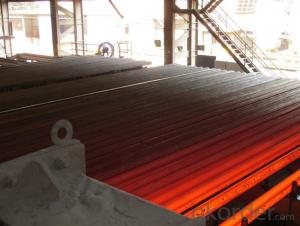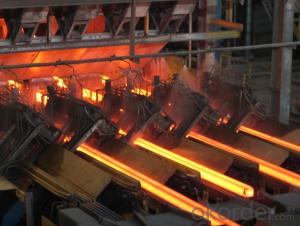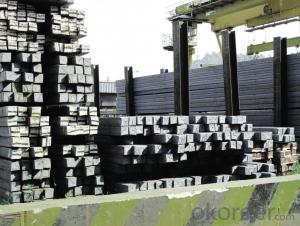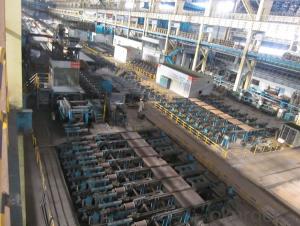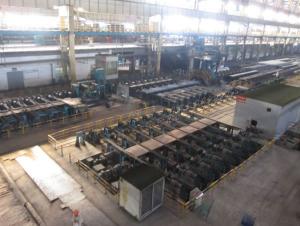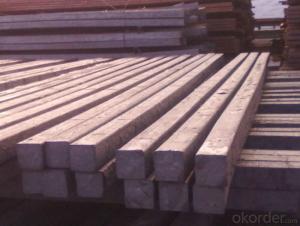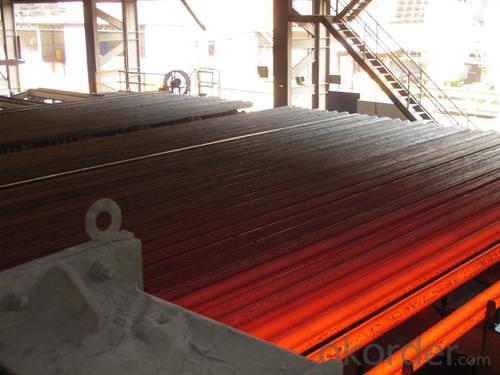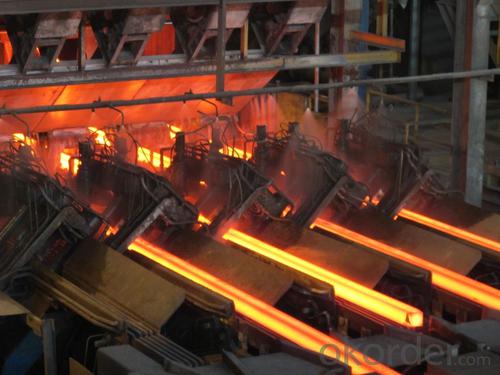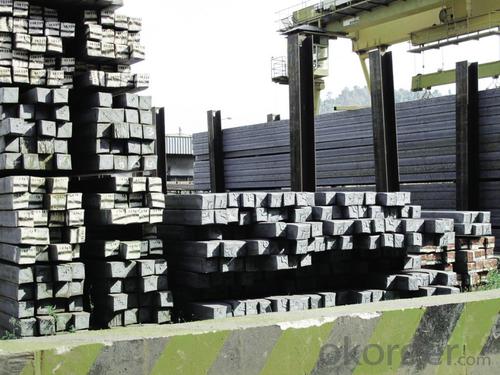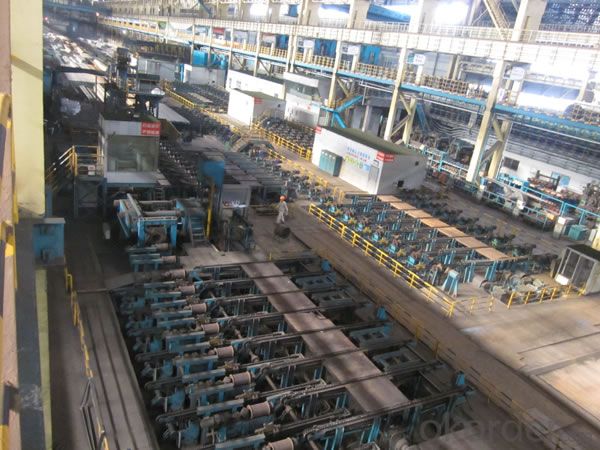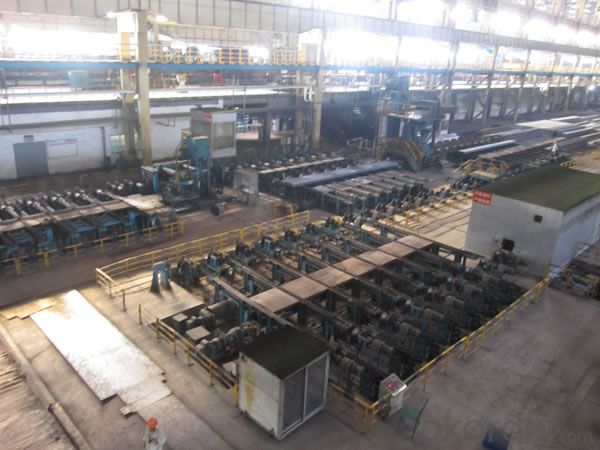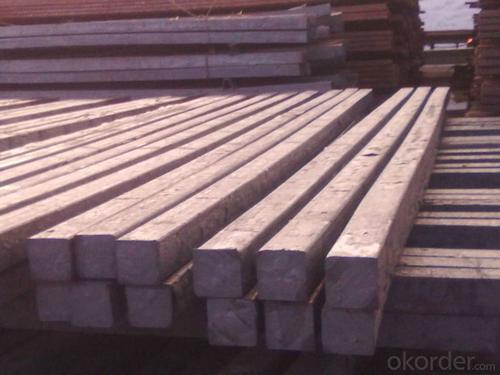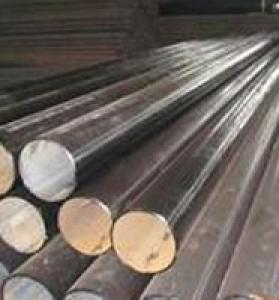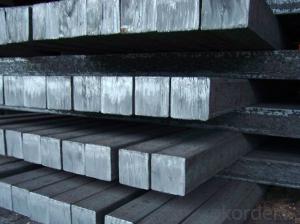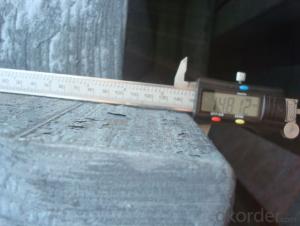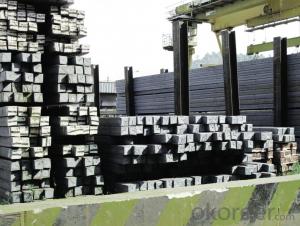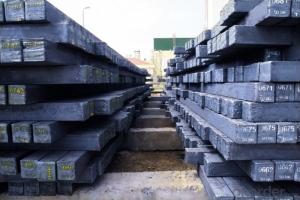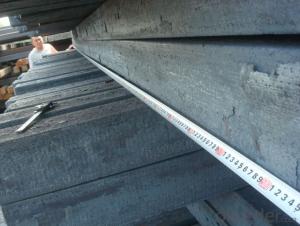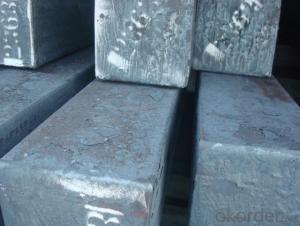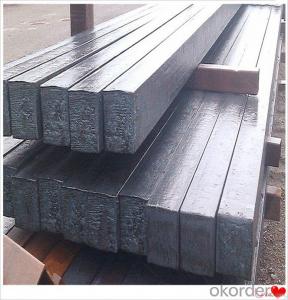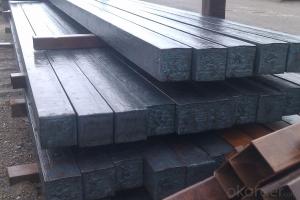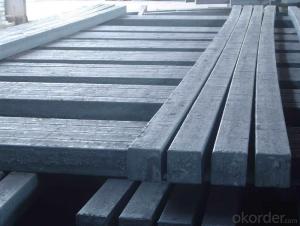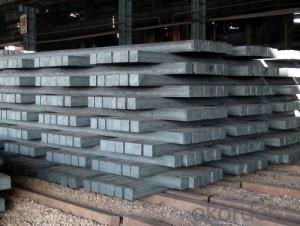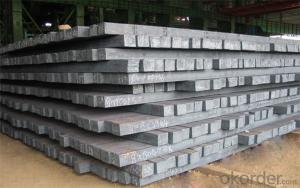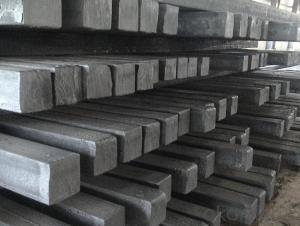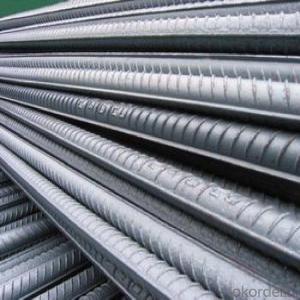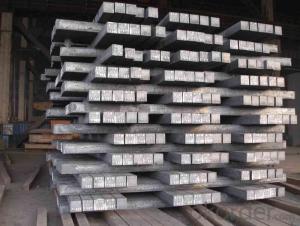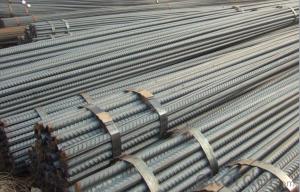Prime Q275 85mm Square Alloy Steel Billet
- Loading Port:
- Shanghai
- Payment Terms:
- TT OR LC
- Min Order Qty:
- 100 m.t.
- Supply Capability:
- 10000 m.t./month
OKorder Service Pledge
OKorder Financial Service
You Might Also Like
Structure of Prime Q275 85mm Square Alloy Steel Billet
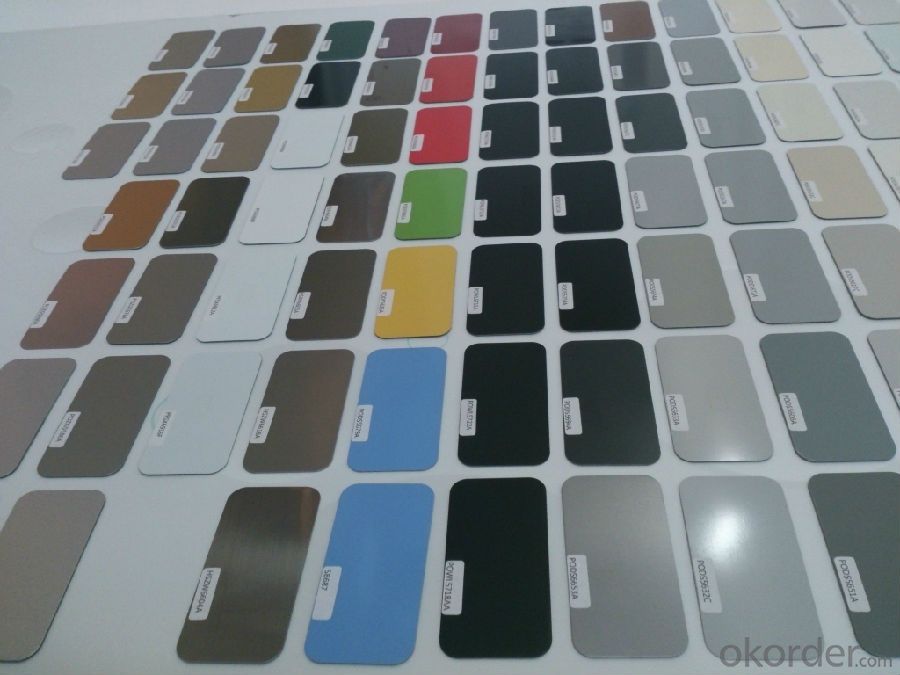
Description of Prime Q275 85mm Square Alloy Steel Billet
1. Prepainted steel coil is coated with organic layer, which provides higher anti-corrosion property and a longer lifespan than that of galvanized or galvalume steel sheets.
2. The base metals for prepainted steel coil consist of cold rolled, HDGI Steel, electro-galvanized and hot-dip alu-zinc coated steel. The finish coats of prepainted steel coil can be classified into groups as follows: polyester, silicon modified polyesters, polyvinylidene fluoride, high-durability polyester, etc.
3. The production process has evolved from one-coating-and-one-baking to double-coating-and-double-baking, and even three-coating-and-three-baking.
4. The color of the prepainted steel coil has a very wide selection, like orange, cream-colored, dark sky blue, sea blue, bright red, brick red, ivory white, porcelain blue, etc.
5. The prepainted steel coils can also be classified into groups by their surface textures, namely regular prepainted sheets, embossed sheets and printed sheets.
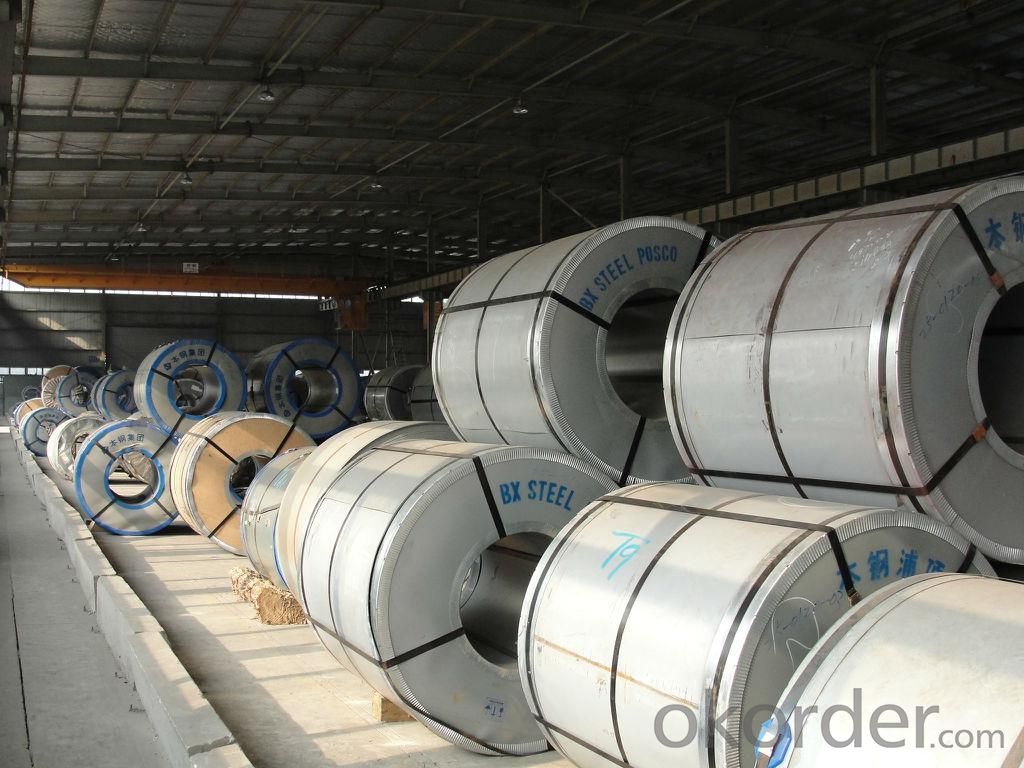
Main Feature of Prime Q275 85mm Square Alloy Steel Billet
Uncoated CR steel sheet
With the features of in line with the international highest standards in demension and shape, excellent surface finish and properties, the products are mainly used in home appliance and automobile industries.
Galvanized steel sheet(include HDG and EG)
With the features of good corrosion resistance, the products are mainly used in automobile, home appliance, electronics, building and machinery manufacture industries, etc.
Precoated steel sheet
With the features of enviromental protection and good processablility, long lasting surface durability, rich in colors, the products are maily used in building, home appliance and furniture industries, etc.
Applications of Prime Q275 80mm Square Alloy Steel Billet
A. Corrugated design makes it excellent waterproof performance
B. Materials as prepainted steel sheets, galvanized steel sheets, galvalume (Al-Zn coated sheets) are available to make corrugated sheet.
C.Those material are durable, anti-corrosion in bad weather for 20-30 years based on it's Zinc(Galvanized) coating or AZ (Galvalume) coating.
D. Different shape of the sheet make it suitable for any style of buildings.
E.Easy to install, no need special tools to fix the sheet.
F.Light weight due to high strength to weight ratio of steel. Light weight means easier handling lower shipping costs, easier installation
G. Different color is availbe base on the RAL Standard make your building more beautiful.
H. We will provide the best solutions if you don't have a exact idea of the specification you want for the steel sheet based on your weather conditions, engineering structure, construction budget and so on.
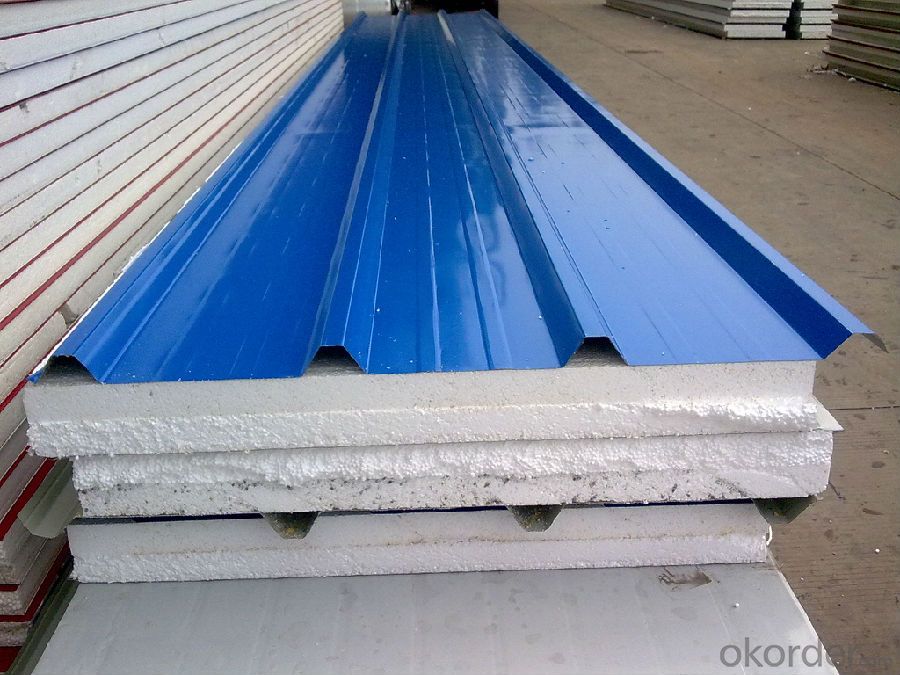
Specifications of Prime Q275 85mm Square Alloy Steel Billet
Product | Billet |
Material Grade | SGCC / SGCH / DX51D+AZ, etc |
Thickness | 0.6-3.0mm |
Width | 500-1500mm |
Tolerance | Thickness: +/-0.02mm , Width:+/-2mm |
Zinc-coating | Z30-150g/m2 |
Technique | Raw material: Hot rolled steel coil --> Cold rolled_>hot dipped galvalume |
Surface | Dried, Chromated, Unoiled |
Spangle | Regular spangle , small spangle, zero spangle |
ID | 508MM 610MM |
Coil weight | 1-25MT |
Export package | Cardboard inner sleeves, Waterproof paper, galvanized steel covered and steel strip packed |
FAQ of Prime Q275 85mm Square Alloy Steel Billet
We have organized several common questions for our clients,may help you sincerely:
1. How Can I Visit There?
Our company is located in Tianjin City, China, near Beijing. You can fly to Tianjin Airport Directly. All our clients, from home or aboard, are warmly welcome to visit us!
2. How Can I Get Some Sample?
We are honored to offer you sample.
3. Why choose CNBM?
Our delivery time about 15-20days for standard sizes, if you have other requirements like hardness, quanity and width ,it is about 20-40days. But don't worry we also try our best for the delivery time ,because time longer and our cost is higher.
- Q: What are the potential applications of steel billets in the oil and gas industry?
- Steel billets have a wide range of potential applications in the oil and gas industry. These applications include but are not limited to: 1. Pipe manufacturing: Steel billets can be used to manufacture pipes that are essential for transporting oil and gas. The high strength and durability of steel make it an ideal material for constructing pipes that can withstand the harsh conditions of drilling, extraction, and transportation. 2. Drill collars: Steel billets can be machined into drill collars, which are heavy, thick-walled steel tubes used in drilling operations. Drill collars provide weight to the drill string, increasing the force applied to the drill bit. The strength and toughness of steel billets make them suitable for this application, as they can withstand the high torque and pressure exerted during drilling. 3. Downhole tools: Steel billets can also be used to manufacture various downhole tools used in oil and gas exploration, such as stabilizers, reamers, and subs. These tools are critical for maintaining wellbore stability, clearing obstructions, and enhancing drilling efficiency. The ability of steel billets to withstand high temperatures, pressures, and abrasive environments makes them suitable for these tools. 4. Offshore structures: Steel billets can be utilized in the construction of offshore platforms, jackets, and other structural components. These structures must withstand extreme weather conditions, corrosive environments, and heavy loads. Steel billets, with their high strength, corrosion resistance, and weldability, are an ideal choice for such applications. 5. Equipment and machinery: Steel billets can be machined into various components and parts for oil and gas equipment and machinery. These include valves, fittings, flanges, connectors, and other critical components used in drilling rigs, pipelines, refineries, and processing facilities. The versatility and reliability of steel make it a preferred material for such applications. In summary, steel billets have numerous potential applications in the oil and gas industry due to their high strength, durability, corrosion resistance, and versatility. From pipe manufacturing to the production of downhole tools, offshore structures, and equipment components, steel billets play a vital role in ensuring the efficiency, safety, and reliability of oil and gas operations.
- Q: What are the common sizes and dimensions of steel billets?
- Steel billets are semi-finished products that are typically produced through continuous casting or by hot rolling methods. The sizes and dimensions of steel billets can vary depending on the specific requirements of the industry and the intended use of the billets. However, there are some common sizes and dimensions that are widely utilized in various applications. The most common size range for steel billets is between 100mm and 150mm square. These billets usually have a length of around 6 meters, although this can also vary depending on the specific needs of the customer or the manufacturing process. Additionally, round steel billets are also commonly produced with diameters ranging from 100mm to 200mm. In terms of weight, steel billets can range from a few hundred kilograms to several metric tons. The weight of a billet is determined by its length, cross-sectional area, and the density of the steel used. The majority of steel billets fall within the range of 1 to 5 metric tons. It is important to note that these dimensions and sizes can vary from one manufacturer to another, and different industries may have specific requirements for their steel billets. For example, the automotive industry may require larger or smaller billets depending on the type of parts being produced. In conclusion, the common sizes and dimensions of steel billets are typically between 100mm and 150mm square, with lengths of around 6 meters. Round billets can have diameters ranging from 100mm to 200mm. The weight of a steel billet can vary from a few hundred kilograms to several metric tons. However, it is essential to consider that these measurements can vary depending on the industry and customer requirements.
- Q: How do steel billet prices fluctuate in the market?
- Steel billet prices fluctuate in the market due to a variety of factors. One of the key factors is the demand and supply dynamics of the steel industry. When there is high demand for steel billets, prices tend to rise as suppliers have more leverage to set higher prices. Conversely, when demand is low, prices may decrease as suppliers compete for a smaller pool of buyers. Another important factor influencing steel billet prices is the cost of raw materials. Steel is primarily made from iron ore, coal, and scrap metal, and any fluctuations in the prices of these raw materials can directly impact the cost of producing steel billets. For example, if there is a shortage of iron ore, the price of steel billets may increase due to higher production costs. Additionally, market conditions and economic factors can also affect steel billet prices. Factors such as inflation, interest rates, and currency exchange rates can impact the overall cost of production and transportation, which in turn may influence the prices of steel billets. Furthermore, geopolitical events and trade policies can also play a role in price fluctuations. Tariffs, trade disputes, or changes in import/export regulations can disrupt the supply chain and impact the prices of steel billets. Overall, steel billet prices are subject to a complex interplay of factors, including demand and supply dynamics, raw material costs, market conditions, and geopolitical events. Traders, manufacturers, and investors closely monitor these factors to anticipate and respond to price fluctuations in the steel billet market.
- Q: What are the main factors affecting the machinability of alloy steel billets?
- The main factors affecting the machinability of alloy steel billets include the composition of the alloy steel, the heat treatment it has undergone, the hardness of the material, the presence of impurities or inclusions, and the cutting parameters used during machining such as cutting speed, feed rate, and depth of cut.
- Q: What are the cost implications of using steel billets in manufacturing?
- Using steel billets in manufacturing can have several cost implications. First and foremost, the cost of steel billets themselves needs to be considered. The price of steel billets can vary depending on factors such as market demand, availability, and the grade of steel used. Therefore, fluctuations in steel prices can directly impact the cost of manufacturing. Additionally, the cost of transportation and logistics needs to be taken into account. Steel billets are heavy and bulky, requiring specialized handling and transportation methods. This can result in higher shipping costs, especially if the manufacturing facility is located far away from the source of steel billets. Furthermore, the cost of processing and shaping steel billets into the desired form for manufacturing needs to be considered. This includes expenses associated with cutting, welding, forging, and any other necessary fabrication processes. The complexity of these processes and the required machinery can have a significant impact on the overall cost of using steel billets. Another cost implication is related to the quality of steel billets. Inferior quality billets can lead to lower product quality and higher rejection rates, resulting in increased manufacturing costs. Therefore, it is important to source steel billets from reputable suppliers to ensure consistent quality and minimize the risk of defects. In terms of long-term costs, the durability and strength of steel make it an attractive choice for manufacturing. Steel is known for its longevity and resistance to wear and tear, reducing the need for frequent replacements and repairs. This can result in long-term cost savings for manufacturers. Lastly, it is essential to consider the environmental and sustainability aspects associated with using steel billets. Steel production is energy-intensive and can have a significant carbon footprint. Increasingly, manufacturers are being held accountable for their environmental impact, which can lead to additional costs in terms of compliance with regulations or implementing sustainable practices. In summary, the cost implications of using steel billets in manufacturing involve the price of the billets themselves, transportation costs, processing expenses, quality considerations, long-term durability, and sustainability factors. Careful analysis of these cost factors is crucial for manufacturers to make informed decisions and optimize their manufacturing processes.
- Q: What is the maximum temperature that a steel billet can withstand?
- The maximum temperature that a steel billet can withstand largely depends on the specific type and grade of steel being used. However, as a general guideline, most steels begin to lose their structural integrity and mechanical properties at temperatures above 800 degrees Celsius (1472 degrees Fahrenheit). At these elevated temperatures, steel starts to undergo significant thermal expansion, which can lead to distortion, warping, and ultimately failure. In certain specialized applications, high-temperature alloys or superalloys can withstand even higher temperatures. These materials are specifically designed to maintain their strength and durability at extreme temperatures, often exceeding 1000 degrees Celsius (1832 degrees Fahrenheit) or more. Nevertheless, it is important to note that the maximum temperature a steel billet can withstand should always be determined by consulting the specific material's technical data sheet or consulting with experts in the field. Variables such as alloy composition, heat treatment, and intended use can all play a role in determining the maximum temperature limit for a steel billet.
- Q: What are the potential applications of steel billets in the automotive sector?
- Steel billets have a wide range of potential applications in the automotive sector due to their strength, durability, and versatility. They can be used to manufacture various automotive components such as engine parts, chassis, suspension systems, and transmission components. Additionally, steel billets can be shaped and formed into different sizes and shapes to meet the specific requirements of automotive manufacturers. Overall, their potential applications in the automotive sector contribute to the production of safer, more efficient, and reliable vehicles.
- Q: How is the quality of steel billets ensured during the manufacturing process?
- The quality of steel billets is ensured during the manufacturing process through various measures such as rigorous inspection and testing procedures. These include visual inspections, dimensional checks, and non-destructive testing techniques like ultrasonic testing or magnetic particle inspection. Additionally, chemical analysis is conducted to verify the composition of the steel billets, ensuring they meet the required specifications. By implementing these quality control measures, any potential defects or inconsistencies can be identified and addressed promptly, ensuring the production of high-quality steel billets.
- Q: What are the different types of steel billet surface treatment defects?
- During the manufacturing process, various defects can arise in the surface treatment of steel billets. The presence of these defects can have a negative impact on the quality and appearance of the billets, making it essential to detect and resolve them in order to guarantee the overall performance of the end product. 1. One common defect is scale, which occurs when the steel billet is exposed to high temperatures. This results in the formation of an oxide layer on the surface, adversely affecting the adhesion of coatings or paints. 2. Inclusions are another type of defect that can be found on the surface of the steel billet. These inclusions are non-metallic particles or impurities that may originate from inadequate cleaning or improper handling during the manufacturing process. They have the potential to undermine the mechanical properties of the steel, leading to an overall reduction in performance. 3. Decarburization is a defect that arises when the carbon content in the outer layer of the steel billet is lost due to exposure to high temperatures or a lack of protective atmosphere. This loss of carbon can result in decreased hardness and strength in the affected area. 4. Pitting is a localized defect characterized by the presence of small cavities or pits on the surface of the steel billet. It can be caused by impurities or exposure to corrosive environments. Pitting has the potential to compromise the structural integrity of the billet and make it more susceptible to corrosion. 5. Surface cracks may occur on the steel billet due to factors such as thermal stress, improper handling, or inadequate cooling. These cracks weaken the billet and increase the risk of failure during subsequent processing or use. 6. Surface roughness refers to an uneven or irregular texture on the surface of the steel billet. It can be caused by factors such as improper machining, inadequate cleaning, or the presence of scale or inclusions. Surface roughness affects the appearance of the billet and can impact its performance in certain applications. In conclusion, it is crucial to identify and resolve these surface treatment defects to ensure the quality and reliability of steel billets. Employing proper manufacturing processes, including thorough cleaning, protective atmospheres, and appropriate handling, is key to minimizing the occurrence of these defects and ensuring optimal performance of the final product.
- Q: What are the factors that affect the quality of steel billets?
- Steel billets, which are semi-finished metal products used in the production of various steel products, can be affected by multiple factors that impact their quality. Key factors to consider are as follows: 1. Raw materials: The quality of steel billets heavily relies on the quality of the raw materials used. The composition of the steel, including the percentage of carbon and other alloying elements, plays a critical role in determining the final quality of the billets. 2. Manufacturing process: The quality of steel billets can be significantly influenced by the manufacturing process employed. Factors such as temperature, pressure, duration of heating and cooling processes, and rate of solidification can impact the internal structure and mechanical properties of the billets. 3. Quality control measures: It is crucial to implement effective quality control measures throughout the production process to ensure the quality of steel billets. Regular inspections, testing, and monitoring of critical parameters, such as dimensions, surface finish, and chemical composition, help identify any deviations from desired specifications and enable corrective actions. 4. Equipment and technology: The quality of equipment and technology used in the production of steel billets can have a substantial impact on their quality. Utilizing advanced machinery and techniques, such as continuous casting or vacuum degassing, can enhance the homogeneity and cleanliness of the billets, resulting in higher-quality products. 5. Environmental conditions: Environmental factors, including temperature, humidity, and cleanliness of the production environment, can also affect the quality of steel billets. Contaminants like dust, pollutants, or moisture can have adverse effects on the surface finish and overall quality of the billets. 6. Handling and storage: Proper handling and storage practices are crucial for maintaining the quality of steel billets. Any mishandling, such as dropping or rough handling, can lead to surface defects or internal damage. Likewise, improper storage conditions, such as exposure to moisture or corrosive substances, can deteriorate the quality of the billets. In conclusion, the quality of steel billets is influenced by a combination of factors, including raw materials, manufacturing process, quality control measures, equipment and technology, environmental conditions, and handling and storage practices. By carefully considering and optimizing these factors, steel manufacturers can produce high-quality billets that meet desired specifications and customer requirements.
Send your message to us
Prime Q275 85mm Square Alloy Steel Billet
- Loading Port:
- Shanghai
- Payment Terms:
- TT OR LC
- Min Order Qty:
- 100 m.t.
- Supply Capability:
- 10000 m.t./month
OKorder Service Pledge
OKorder Financial Service
Similar products
Hot products
Hot Searches
Related keywords
